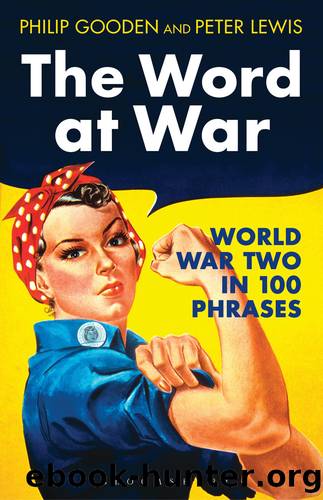The Word at War by Philip Gooden

Author:Philip Gooden
Language: eng
Format: epub
Publisher: Bloomsbury Publishing
Published: 2014-08-19T00:00:00+00:00
Winston and the Cross He had to Bear
[British/French: Winnie/Deux Mètres (Two Metres)]
As with some other successful and charismatic political leaders, Winston Churchillâs first name alone was enough to identify him. On Sunday, 3 September 1939, the day that war was declared, the 64-year-old Churchill was appointed First Lord of the Admiralty, a return to the post that he had held in the early part of World War One. Out went the signal from Whitehall to the Royal Navy, complete with exclamation mark: âWinston is back!â For the general public Churchill was âWinnieâ and welcomed as a hero, especially during the Blitz. As the Australian Sunday Times reported in February 1941: âGreeted with shouts of âGood Old Winnie,â British Premier (Mr Winston Churchill) told Portsmouth and Southampton dockers, âWe shall come through.ââ The affectionate diminutive spread across the Atlantic and it was as âWinnieâ that he was familiar to the American public.
Assisted by his jowly features, growling tones and combative nature, Churchill cultivated the bulldog image, and it may have been the Russians who first termed him the âBritish Bulldogâ. This image can be conflated with that of John Bull, originally a satirical depiction of the English spirit, and referring to a bull rather than the bulldog sometimes envisaged by later generations. The name Winston continued to resonate after the war, and it is no coincidence that George Orwell chose it for his heroic, but doomed, protagonist in Nineteen Eighty-Four (1949), just as he chose to make him Winston Smith, thus yoking together the forename of the most famous living Englishman with the most common and recognisable of English surnames. Churchill enjoyed communicating with the American President, Franklin Delano Roosevelt, under the code name of âformer naval personâ.* It was an in-joke allusion to his time at the Admiralty, but Rooseveltâs nickname was nothing more elaborate than his initials, FDR.
The founder of the Free French forces, General Charles de Gaulle, was an awkward, prickly figure, acutely conscious of his position as a leader who was almost entirely dependent on the goodwill of the British and Americans for as long as he was in exile from his own country. In the run-up to D-Day, de Gaulle was furious at being excluded from the invasion planning and at the reluctance of the US to acknowledge him as head of the provisional government of France. In the event, he made a triumphal entry into Paris on 26 August 1944. To senior Americans, the 6 foot 5 inch French leader was known as Deux Mètres (a variant on a long-standing French nickname for him, Double Mètre). Less respectfully, the recurring stresses of de Gaulleâs relationship with Churchill gave the British Prime Minister critical material for what he referred to as his âFrog Fileâ. More wittily, de Gaulle was also referred to as Churchillâs âCross of Lorraineâ, and though the phrase is sometimes attributed to him it was actually the punning invention of the British general who accompanied de Gaulle across the Channel after the fall of France in 1940.
Download
This site does not store any files on its server. We only index and link to content provided by other sites. Please contact the content providers to delete copyright contents if any and email us, we'll remove relevant links or contents immediately.
Cecilia; Or, Memoirs of an Heiress — Volume 1 by Fanny Burney(32536)
Cecilia; Or, Memoirs of an Heiress — Volume 2 by Fanny Burney(31934)
Cecilia; Or, Memoirs of an Heiress — Volume 3 by Fanny Burney(31925)
The Lost Art of Listening by Michael P. Nichols(7485)
Asking the Right Questions: A Guide to Critical Thinking by M. Neil Browne & Stuart M. Keeley(5751)
We Need to Talk by Celeste Headlee(5604)
On Writing A Memoir of the Craft by Stephen King(4924)
Dialogue by Robert McKee(4385)
Pre-Suasion: A Revolutionary Way to Influence and Persuade by Robert Cialdini(4208)
I Have Something to Say: Mastering the Art of Public Speaking in an Age of Disconnection by John Bowe(3871)
Elements of Style 2017 by Richard De A'Morelli(3336)
The Book of Human Emotions by Tiffany Watt Smith(3289)
Fluent Forever: How to Learn Any Language Fast and Never Forget It by Gabriel Wyner(3071)
Name Book, The: Over 10,000 Names--Their Meanings, Origins, and Spiritual Significance by Astoria Dorothy(2967)
Why I Write by George Orwell(2944)
Good Humor, Bad Taste: A Sociology of the Joke by Kuipers Giselinde(2939)
The Art Of Deception by Kevin Mitnick(2785)
The Grammaring Guide to English Grammar with Exercises by Péter Simon(2733)
Ancient Worlds by Michael Scott(2675)
